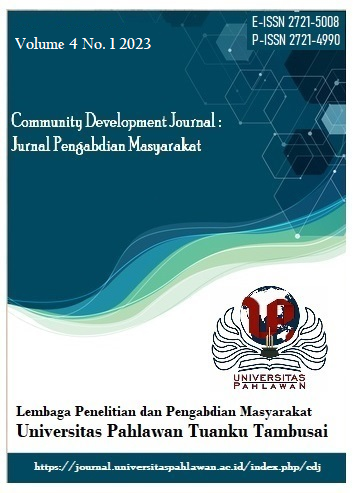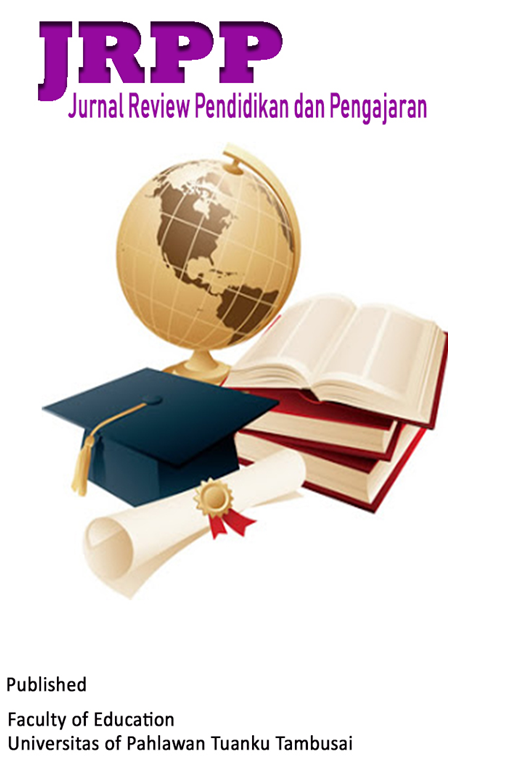DO INNOVATIVE WORK BEHAVIOR AND ORGANIZATIONAL COMMITMENT CREATE BUSINESS PERFORMANCE: A LITERATURE REVIEW
DOI:
https://doi.org/10.31004/cdj.v4i1.12479Keywords:
Innovative Work Behavior, Commitment, Organizational, PerformanceAbstract
Nowadays, there are many new knowledge, innovations, and changes marked by the rapid advancement of technology. Business competition is becoming increasingly competitive. This research will explain two important constructs that can create increased business performance and remain adaptive, namely innovative work behavior and organizational commitment. This condition is very crucial, considering that many business organizations neglect to produce innovative employees and build solid organizational commitment, thus marked by layoffs. The literature review method is used in this study in order to find complete and complementary results. Based on the literature review, this study arrived at the finding that innovative work behavior and organizational commitment can create successful business performance such as increased sales, profits, satisfaction, market share, high productivity, employee loyalty, and low employee turnover. Such indicators are good assets for companies to remain agile in improvising in an increasingly modern era in implementing business strategies. The results of this study are expected to be discussed in management science and business administration, and implemented for certain parties in order to achieve business success.References
Abdullatif, T. Noaman., Johari, Husna., & Adnan, Zurida. (2016). The Influence of Extrinsic Motivation on Innovative Work Behaviour with Moderating Role of Quality Culture. Journal of Bussiness and Social Review in Emerging Economies, 2(1), 79–86.
Aboazoum, H. M. E., Nimran, U., & Musadieq, M. al. (2015). Analysis Factors Affecting Employees Job Performance in Libya. IOSR Journal of Business and Management (IOSR-JBM), 17(7), 42–49. https://doi.org/10.9790/487X-17714249
Afsar, B. (2016). The impact of person-organization fit on innovative work behavior: The mediating effect of knowledge sharing behavior. International Journal of Health Care Quality Assurance, 29(2), 104–122. https://doi.org/10.1108/IJHCQA-01-2015-0017/FULL/XML
Agarwal, U. A. (2014). Linking justice, trust and innovative work behaviour to work engagement. Personnel Review, 43(1), 41–73. https://doi.org/10.1108/PR-02-2012-0019
Allen, N. J., & Meyer, J. P. (1993). Organizational commitment: Evidence of career stage effects? Journal of Business Research, 26(1), 49–61. https://doi.org/10.1016/0148-2963(93)90042-N
Almutairi, D. O. (2016). The Mediating Effects of Organizational Commitment on the Relationship between Transformational Leadership Style and Job Performance. International Journal of Business and Management, 11(1), 231–241. https://doi.org/10.5539/ijbm.v11n1p231
Ausat, A. M. A. (2023). The Application of Technology in the Age of Covid-19 and Its Effects on Performance. Apollo - Journal of Tourism and Business, 1(1), 14–22. https://doi.org/10.58905/apollo.v1i1.8
Ausat, A. M. A., & Suherlan, S. (2021). Obstacles and Solutions of MSMEs in Electronic Commerce during Covid-19 Pandemic: Evidence from Indonesia. BASKARA: Journal of Business and Entrepreneurship, 4(1), 11–19. https://doi.org/10.54268/BASKARA.4.1.11-19
Ausat, A. M. A., Suherlan, S., Peirisal, T., & Hirawan, Z. (2022). The Effect of Transformational Leadership on Organizational Commitment and Work Performance. Journal of Leadership in Organizations, 4(4), 61–82. https://doi.org/10.22146/jlo.71846
Ausat, A. M. A., Widayani, A., Rachmawati, I., Latifah, N., & Suherlan, S. (2022). The Effect of Intellectual Capital and Innovative Work Behavior on Business Performance. Journal of Economics, Business, & Accountancy Ventura, 24(3), 363–378. https://doi.org/10.14414/jebav.v24i3.2809
Bos-Nehles, A., Renkema, M., & Janssen, M. (2017). HRM and innovative work behaviour: a systematic literature review. Personnel Review, 46(7), 1228–1253. https://doi.org/10.1108/PR-09-2016-0257
Brines, S., Shepherd, D., & Woods, C. (2013). SME family business innovation: exploring new combinations. Journal of Family Business Management, 3(2), 117–135. https://doi.org/10.1108/JFBM-01-2012-0002/FULL/XML
Camisón, C., & Villar-López, A. (2014). Organizational innovation as an enabler of technological innovation capabilities and firm performance. Journal of Business Research, 67(1), 2891–2902. https://doi.org/10.1016/J.JBUSRES.2012.06.004
de Jong, J., & den Hartog, D. (2010). Measuring innovative work behaviour. Creativity and Innovation Management, 19(1), 23–36. https://doi.org/10.1111/j.1467-8691.2010.00547.x
Dhea, P. C. (2016). Pengaruh Kemampuan, Motivasi Dan Komitmen Terhadap Kinerja Pegawai. Jurnal Ekonomi, Bisnis & Entrepreneurship, 10(1), 17–24.
Dodi Setiawan, R., & Ancok, D. (2013). Pengaruh Budaya Inovasi Persepsian dan Dukungan Organisasi Persepsian terhadap Perilaku Inovatif Karyawan. Universitas Gadjah Mada.
Efandi, S., & Syuhada, M. N. (2021). Innovative work behavior and influencing factors. IPTEKS TERAPAN, 15(3), 241–250.
Etikariena, A., & Kalimashada, S. B. I. (2021). The Influence of Organizational Climate on Innovative Work Behaviour. Jurnal Psikologi, 20(1), 22–34. https://doi.org/10.14710/jp.20.1.22-34
Etikariena, A., & Muluk, H. (2014). Correlation between organizational memory and innovative work behavior. Makara Human Behavior Studies in Asia, 18(2), 77. https://doi.org/doi:10.7454/mssh.v18i2.3463
Expósito, A., & Sanchis-Llopis, J. A. (2019). The relationship between types of innovation and SMEs’ performance: a multi-dimensional empirical assessment. Eurasian Business Review, 9(2), 115–135. https://doi.org/10.1007/S40821-018-00116-3/TABLES/6
Fithriani, A. (2016). Pengaruh Kepuasan Kerja dan Komitmen Organisasional terhadap Kinerja Dosen Tetap Yayasan Pendidikan Universitas Achmad Yani Kalimantan Selatan. Socioscientia, 8(1), 109–120.
Ghazzawi, I. (2019). Organizational Commitment: A Review of the Conceptual and Empirical Literature and a Research Agenda. International Leadership Journal, 11(1), 78–119.
Hadi, N., & Tentama, F. (2020). Affective Commitment, Continuance Commitment and Normative Commitment in Reflecting Organizational Commitment. American International Journal of Business Management (AIJBM), 3(8), 148–156. www.aijbm.com
Harmen, H., Amanah, D., & Harahap, D. A. (2020). The Workload and Organizational Commitment to Job Satisfaction. The International Journal of Humanities & Social Studies, 8(6), 205–215. https://doi.org/10.24940/theijhss/2020/v8/i6/HS2006-087
Irawan, D. (2020). Peningkatan Daya Saing Usaha Micro Kecil dan Menengah Melalui Jaringan Usaha. Coopetition: Jurnal Ilmiah Manajemen, 11(2), 103–116.
Jankelová, N., Joniaková, Z., & Mišún, J. (2021). Innovative Work Behavior—A Key Factor in Business Performance? The Role of Team Cognitive Diversity and Teamwork Climate in This Relationship. Journal of Risk and Financial Management, 14(4), 1–16. https://doi.org/10.3390/jrfm14040185
Jayaweera, T. (2015). Impact of Work Environmental Factors on Job Performance, Mediating Role of Work Motivation: A Study of Hotel Sector in England. International Journal of Business and Management, 10(3), 271–278. https://doi.org/10.5539/ijbm.v10n3p271
Kafetzopoulos, D., Psomas, E., & Skalkos, D. (2020). Innovation dimensions and business performance under environmental uncertainty. European Journal of Innovation Management, 23(5), 856–876. https://doi.org/10.1108/EJIM-07-2019-0197/FULL/XML
Khan, Ri. (2010). The Impact of Organizational Commitment on Employee Job Performance. European Journal of Social Sciences, 15(3), 292–298. https://www.sid.ir/en/journal/ViewPaper.aspx?ID=288403
Kraus, S., Pohjola, M., & Koponen, A. (2012). Innovation in family firms: An empirical analysis linking organizational and managerial innovation to corporate success. Review of Managerial Science, 6(3), 265–286. https://doi.org/10.1007/s11846-011-0065-6
Kuncoro, W., & Suriani, W. O. (2018). Achieving sustainable competitive advantage through product innovation and market driving. Asia Pacific Management Review, 23(3), 186–192.
Laily, N. (2017). Pengaruh Gaya Kepemimpinan Transformasional dan Komitmen Organisasi terhadap Kinerja Karyawan (Studi Kasus Karyawan Bagian Kantor pada PT. Agung Automall Pekanbaru). Jom FISIP, 4(2), 1–10.
Lapointe, É., & Vandenberghe, C. (2015). Examination of the Relationships Between Servant Leadership, Organizational Commitment, and Voice and Antisocial Behaviors. Journal of Business Ethics, 148(1), 99–115. https://doi.org/10.1007/S10551-015-3002-9
Ling, S. M., & Bhatti, M. A. (2014). Work Stress and Job Performance in Malaysia Academic Sector: Role of Social Support as Moderator. Journal of Economics, Management and Trade, 4(12), 1986–1998. https://doi.org/10.9734/BJEMT/2014/12098
Löfsten, H. (2014). Product innovation processes and the trade-off between product innovation performance and business performance. European Journal of Innovation Management, 17(1), 61–84. https://doi.org/10.1108/EJIM-04-2013-0034/FULL/XML
Maldonado-Guzmán, G., Marín-Aguilar, J. T., & García-Vidales, M. (2018). Innovation and Performance in Latin-American Small Family Firms. Asian Economic and Financial Review, 8(7), 986–98. https://doi.org/10.18488/journal.aefr.2018.87.986.998
Masud, H., & Daud, W. N. W. (2019). Human Resource Management Practices and Organizational Commitment: Research Methods, Issues, and Future Directions. Review of Integrative Business and Economics Research, 8(1), 217–226.
Mensah, J. O., Copuroglu, G., & Fening, F. A. (2012). The status of total quality management (TQM) in Ghana: A comparison with selected quality awards winners from Turkey. International Journal of Quality and Reliability Management, 29(8), 851–871. https://doi.org/10.1108/02656711211270333/FULL/XML
Mete, E. S., & B?y?k, Y. (2016). The Relationship between Organizational Commitment, Organizational Identification, Person-Organization Fit and Job Satisfaction: A Research on IT Employees. International Review of Management and Business Research, 5(3), 870–901.
Mohammed, F., & Eleswed, M. (2013). Job Satisfaction and Organizational Commitment: A Correlational Study in Bahrain. International Journal of Business, Humanities and Technology, 3(5), 43–53. www.ijbhtnet.com
Musabah, S., Al, B., & Mohamad, N. A. (2017). The Influence of Organizational Commitment on Omani Public Employees’ Work Performance. International Review of Management and Marketing, 7(2), 151–160. http: www.econjournals.com
Nasomboon, B. (2014). The Relationship among Leadership Commitment, Organizational Performance, and Employee Engagement. International Business Research, 7(9), 77–90. https://doi.org/10.5539/ibr.v7n9p77
Niesen, W., Hootegem, A. van, Elst, T. vander, Battistelli, A., & Witte, H. de. (2018). Job Insecurity and Innovative Work Behaviour: A Psychological Contract Perspective. Psychologica Belgica, 57(4), 174–189. https://doi.org/10.5334/pb.381
Odoardi, C., Battistelli, A., Montani, F., & Peiró, J. M. (2019). Affective Commitment, Participative Leadership, and Employee Innovation: A Multilevel Investigation. Revista de Psicología Del Trabajo y de Las Organizaciones, 35(2), 103–113. https://doi.org/10.5093/jwop2019a12
Örnek, A. ?., & Ayas, S. (2015). The Relationship between Intellectual Capital, Innovative Work Behavior and Business Performance Reflection. Procedia - Social and Behavioral Sciences, 195(July), 1387–1395. https://doi.org/10.1016/j.sbspro.2015.06.433
Prajogo, D. I. (2016). The strategic fit between innovation strategies and business environment in delivering business performance. International Journal of Production Economics, 171(1), 241–249. https://doi.org/10.1016/J.IJPE.2015.07.037
Santoso, H., & Heng, C. (2019). Creating innovative work behaviour: The roles of self efficacy, leader competency, and friendly workplace. International Journal of Economics and Business Research, 18(3), 328–342. https://doi.org/10.1504/IJEBR.2019.102732
Saunila, M. (2016). Innovation capability in achieving higher performance: perspectives of management and employees. Technology Analysis & Strategic Management, 29(8), 903–916. https://doi.org/10.1080/09537325.2016.1259469
Shanker, R., Bhanugopan, R., van der Heijden, B. I. J. M., & Farrell, M. (2017). Organizational climate for innovation and organizational performance: The mediating effect of innovative work behavior. Journal of Vocational Behavior, 100(June), 67–77. https://doi.org/10.1016/J.JVB.2017.02.004
Sok, P., O’Cass, A., & Miles, M. P. (2016). The Performance Advantages for SMEs of Product Innovation and Marketing Resource–Capability Complementarity in Emerging Economies. Journal of Small Business Management, 54(3), 805–826. https://doi.org/10.1111/JSBM.12172
Subagja, A. D., Ausat, A. M. A., & Suherlan. (2022). The Role of Social Media Utilization and Innovativeness on SMEs Performance. Jurnal IPTEK-KOM (Jurnal Ilmu Pengetahuan Dan Teknologi Komunikasi), 24(2), 85–102. https://doi.org/https://doi.org/10.17933/iptekkom.24.2.2022.85-102
Suharto, Suyanto, & Hendri, N. (2019). The Impact of Organizational Commitment on Job Performance. International Journal of Economics and Business Administration Volume, VII (2), 189–206.
Suherman, U. D. (2019). Pentingnya Kepemimpinan dalam Organisasi. Jurnal Ilmu Akuntansi Dan Bisnis Syariah, 1(2), 260–274.
Sumiati. (2020). Improving Small Business Performance: The Role of Entrepreneurial Intensity and Innovation. The Journal of Asian Finance, Economics and Business, 7, 211–218. https://doi.org/10.13106/jafeb.2020.vol7.n10.211
Susilo, J., & Satrya, I. G. B. H. (2019). Pengaruh Kepuasan Kerja terhadap Turnover Intention yang dimediasi oleh Komitmen Organisasional Karyawan Kontrak. E-Jurnal Manajemen, 8(6), 3700–3729. https://doi.org/10.24843/EJMUNUD.2019.v08.i06.p15
Veloso, E., Silva, R. C. da, Trevisan, L., & Dutra, J. (2020). Technological innovations in the work environment and the career of the millennium generation. Innovation & Management Review, 17(4), 379–394. https://doi.org/10.1108/INMR-05-2019-0070
Widyawati, L. M., & Yudantara, I. G. A. P. (2020). Pengaruh Penggunaan Kredit Usaha Rakyat, Komitmen Organisasi dan Penggunaan Informasi Akuntansi terhadap Kinerja Usaha UMKM. Jurnal Ilmiah Akuntansi Dan Humanika, 10(3), 393–402.
Wuryani, E. (2013). Peranan Komitmen organisasi dalam Meningkatkan Kinerja Perusahaan Berdasarkan the Indonesian Institute for Corporate Governance (IICG). Jurnal Ilmu Ekonomi Dan Sosial, 1(3), 287–298.
Yang, J. S. (2017). The governance environment and innovative SMEs. Small Business Economics, 48, 525–541.
Zahra, S. A. (2017). A Conceptual Model of Entrepreneurship as Firm Behavior: A Critique and Extension: Entrepreneurship Theory and Practice, 17(4), 5–21. https://doi.org/10.1177/104225879301700401

Downloads
Published
How to Cite
Issue
Section
License
Copyright (c) 2023 Lili Fadli Muhamad, Rizal Bakti, Mohamad Trio Febriyantoro, Kraugusteeliana Kraugusteeliana, Abu Muna Almaududi Ausat

This work is licensed under a Creative Commons Attribution-ShareAlike 4.0 International License.














